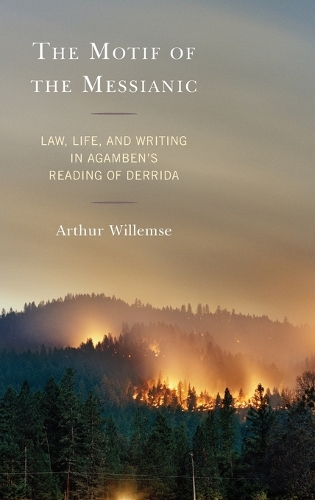
The Motif of the Messianic: Law, Life, and Writing in Agamben's Reading of Derrida
(Hardback)
Publishing Details
The Motif of the Messianic: Law, Life, and Writing in Agamben's Reading of Derrida
By (Author) Arthur Willemse
Bloomsbury Publishing PLC
Lexington Books
13th December 2017
United States
Classifications
Professional and Scholarly
Non Fiction
195
Physical Properties
Hardback
192
Width 159mm, Height 239mm, Spine 19mm
422g
Description
The Motif of the Messianic is the first sustained commentary on Giorgio Agambens use of the messianic, with a view of his polemical relationship to Jacques Derrida. Arthur Willemse explains Agambens move beyond Derrida by way of his critical intervention in the Aristotelian concept of potentiality and the ensuing transformation of the role of theology and theist assumptions within philosophy. Willemse argues that it is not the case that Agamben announces the redundancy of theology, but instead he revitalizes it by changing its focus from the realm of the sacred toward the realm of the profane.
Reviews
In The Motif of the Messianic, Arthur Willemse stages a much-needed, original dialogue between Giorgio Agamben and Jacques Derrida on the question of the messianic. Willemse convincingly argues that the basic ingredients of such a dialogue are to be found in Agambens and Derridas reflections on law, life and writing. Thus, this important book shows how a reflection on the messianic goes to the heart of the philosophical commitments of present-day continental thought. -- Gert-Jan van der Heiden, professor of Metaphysics, Radboud University Nijmegen
Arthur Willemse does a superb job of interpreting Agamben and Derrida in his new book. In the process he sheds light on the complex relations between life, truth, ontology, and theology. This is a pathbreaking study and a must read for all students and academics interested in the politics of writing and the challenges of deconstruction. -- Professor Darrow Schecter, Professor of Critical Theory at the University of Sussex
This is a timely topic, contributing to Agamben scholarship which has only recently begun in a serious and sustained fashion. The decision to examine the relation between truth and life through an exploration of law and writing is unusual and shown very plausible as thestudy proceeds. Particularly impressive, to my mind, is the discussion of khra which allowed for the approximation of Derrida with a submerged messianic force, a figure like Bartleby. -- Tanja Staehler, Professor of European Philosophy, University of Sussex
This is an original and timely analysis of the role of the motif of the messianic in Agambens work, a topic of central importance whose full meaning has yet to be truly excavated. Many have been misled by early misconceptions of Agamben as a so-called Messianic thinker. Willemse will set them back on the right track, as well as laying out a future map for how to read Agamen in terms of his complex, at times confusing, but always profound interactions with this central theological and political construction. -- William Watkin, Professor of Contemporary Philosophy and Literature, Brunel University
Author Bio
Arthur Willemse earned his PhD in philosophy at the University of Sussex.
